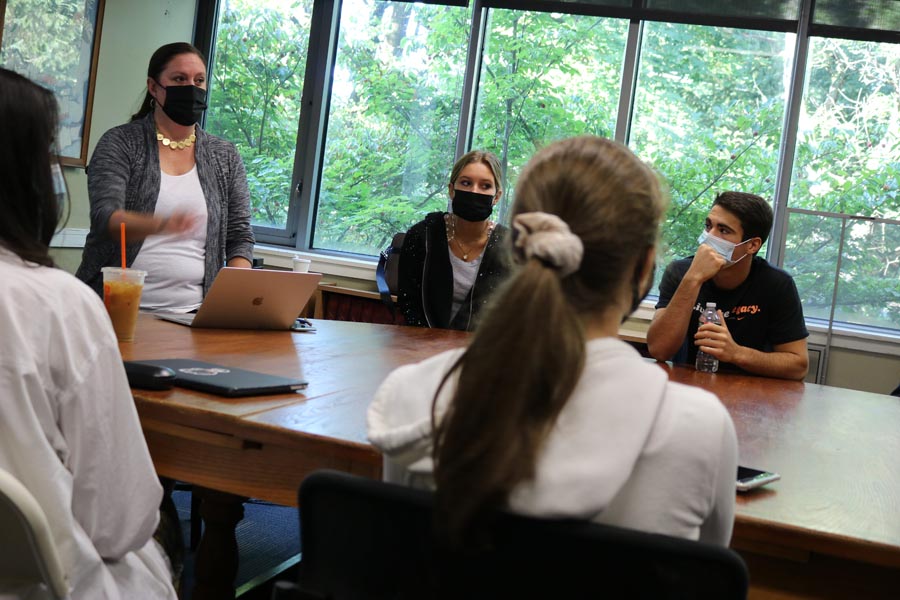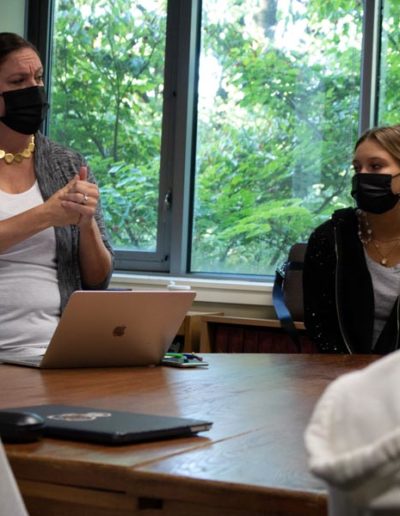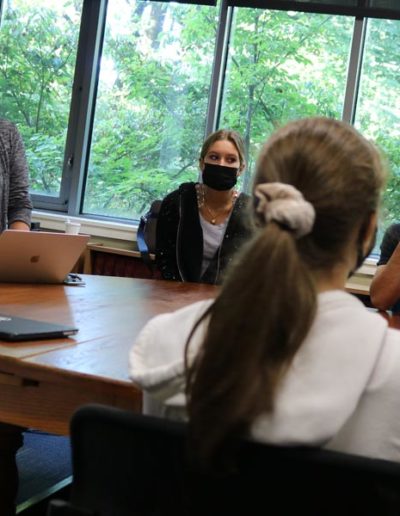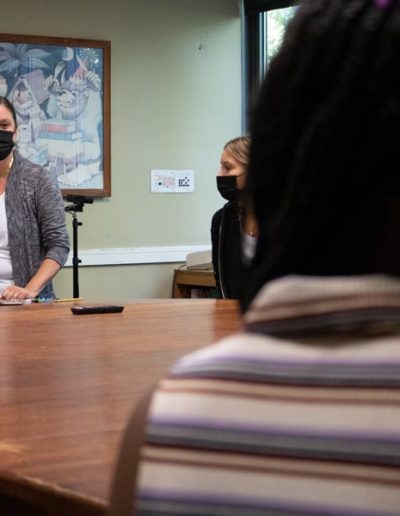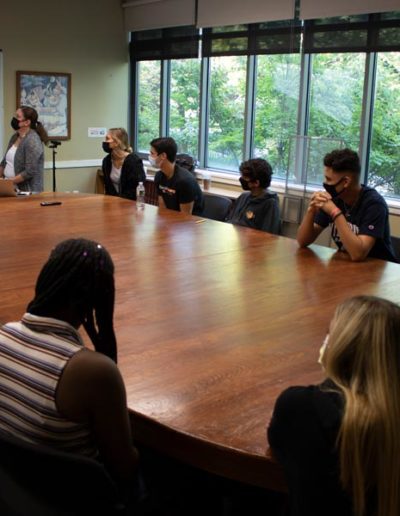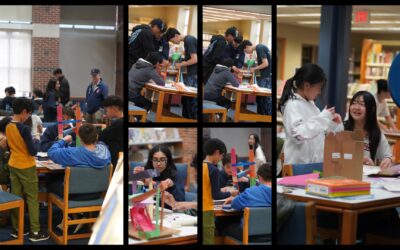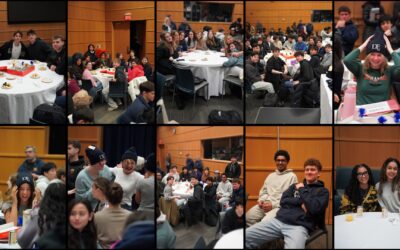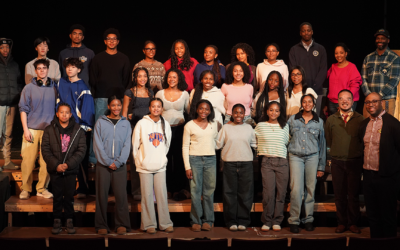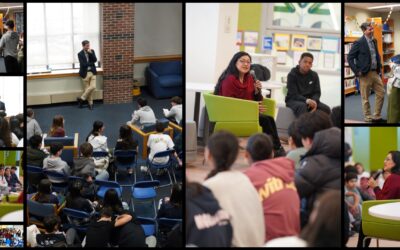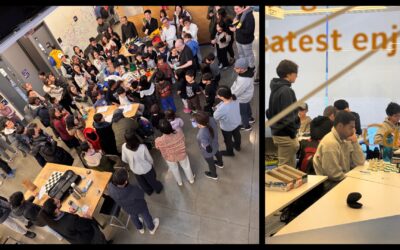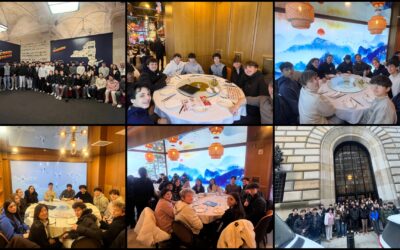Meredith (“Mimi”) Garcia had the unique challenge of teaching “Apocalyptic Lit” amidst the COVID-19 hybrid year. Still, the central questions of the course remained, “Will the apocalypse bring total annihilation, transcendence, bloodthirsty zombies, or all of the above? Will it bring people together or tear them apart?” As a medium, fiction allows for distance from both the material and reality, enough to critically engage with the text. Despite the fantastical, sci-fi qualities to apocalyptic literature, Mimi stresses that each text, from The Walking Dead to Kazuo Ishiguro’s Never Let Me Go, speak to questions of human nature and of hope.
Mimi’s new course offering, “Globalization, Literature, & Film”, investigates how globalization and media have come to shape each other and our everyday lives. The course utilizes films like Akira Kurosawa’s Rashomon (1950) and Walter Salles’ Motorcycle Diaries (2004) to discuss how politics, history, and cross-cultural encounters come to manifest in film. Mimi notes that the entire film industry and how we have come to watch film also plays a role in how we analyze and reflect on the relationship between literature and media—to be both critical of the past and the present.
D-E Celebrates V-DAY 2026 With Moving Presentations
D-E’s V-Day 2026, with the theme of “Rise for our Bodies, Our Future, Our Earth,” was a stunningly powerful event organized by the leaders of the Women of Color Affinity group, Amanda Santos ’26, Ripley Chang ’27, and Yaritza Menjivar ’27, under the guidance of Dra....
3D-E Hosts Engineering Challenge
The 3D Printing and Engineering Club (3D-E) recently hosted an engineering event in The Imperatore Library in honor of National Engineers Week, celebrated nationally this week. Innovation Coordinator Ms. Larionoff explained that the cross-divisional event is based on...
CODES PaintFest Service Learning Program Highlights
The Upper School (US) CODES Club recently hosted a fantastic “PaintFest” service learning program in partnership with the Foundation for Hospital Art. Their efforts culminated in beautiful, vivid paintings that will eventually find their way to the walls of Englewood...
Seniors Celebrate 100 Days Countdown to Commencement 2026
Let the countdown begin! The D-E Class of 2026 was recently invited to Hajjar Auditorium to celebrate 100 Days to Commencement. During the event, hosted by the D-E Development and Alumni Relations Team, students were treated to a D-Electable breakfast of blue-and-gold...
Celebrating Black History Month
Black History Month celebrations continued this week in the Middle and Upper Schools with assemblies in Schenck Auditorium facilitated by the Diversity, Equity, Inclusion & Belonging (DEIB) Department. For the US Assembly, members of the Black Affinity student...
Author Visits Help Enrich MS Literary Units
Authors recently visited our Middle School (MS) to enrich current units of study. Seventh graders hosted a Q&A session with award-winning author Reyna Grande, whose memoir, “The Distance Between Us,” is central to their cross-curricular Anatomy of a Human Project....
D-E Celebrates Lunar New Year!
D-E rang in the Lunar New Year with dynamic assembly performances and a jubilant celebration in the Wharton Lessin Dining Hall, graciously facilitated by our Asian American, Chinese, and Korean Parent Affinity Groups. Festivities began in the Lower School (LS) with...
Kindergarten & 1st Grade Valentine’s Concerts 2026
In a beloved D-E tradition, this week our Lower School (LS) Kindergarten and 1st Grade students tugged at heartstrings during their Valentine’s Chorus Concerts for families. Hajjar Auditorium was decked with red, pink, and white balloon displays and paper hearts with...
D-E 360° LS Chess Team Competes at Scholastic Grand Prix
The D-E 360° Lower School Chess Team continues its winning streak with a fantastic showing at the recent Scholastic (K-9) Grand Prix, hosted in the D-E STEM Center. Players came from a wide range of schools across New Jersey and New York, and 28 students from D-E...
Economics & Business Finance Students Visit the Fed
Upper School (US) students in our Economics and Business Finance classes recently took a field trip to the Federal Bank of New York. “While there, they listened to a lecture on basic monetary policy and the role the central bank plays in managing the economy,” said US...

